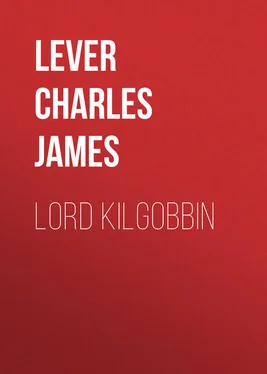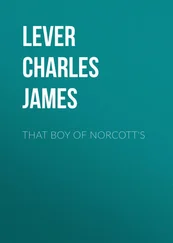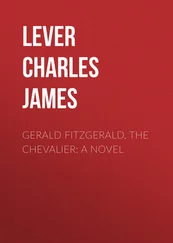Charles Lever - Lord Kilgobbin
Здесь есть возможность читать онлайн «Charles Lever - Lord Kilgobbin» — ознакомительный отрывок электронной книги совершенно бесплатно, а после прочтения отрывка купить полную версию. В некоторых случаях можно слушать аудио, скачать через торрент в формате fb2 и присутствует краткое содержание. Жанр: literature_19, foreign_antique, foreign_prose, на английском языке. Описание произведения, (предисловие) а так же отзывы посетителей доступны на портале библиотеки ЛибКат.
- Название:Lord Kilgobbin
- Автор:
- Жанр:
- Год:неизвестен
- ISBN:нет данных
- Рейтинг книги:3 / 5. Голосов: 1
-
Избранное:Добавить в избранное
- Отзывы:
-
Ваша оценка:
- 60
- 1
- 2
- 3
- 4
- 5
Lord Kilgobbin: краткое содержание, описание и аннотация
Предлагаем к чтению аннотацию, описание, краткое содержание или предисловие (зависит от того, что написал сам автор книги «Lord Kilgobbin»). Если вы не нашли необходимую информацию о книге — напишите в комментариях, мы постараемся отыскать её.
Lord Kilgobbin — читать онлайн ознакомительный отрывок
Ниже представлен текст книги, разбитый по страницам. Система сохранения места последней прочитанной страницы, позволяет с удобством читать онлайн бесплатно книгу «Lord Kilgobbin», без необходимости каждый раз заново искать на чём Вы остановились. Поставьте закладку, и сможете в любой момент перейти на страницу, на которой закончили чтение.
Интервал:
Закладка:
Nor did the strong cheroots, which he smoked to clear his faculties and develop his mental resources, always contribute to this end, though their soothing influence certainly helped to make him more satisfied with his judgments.
‘Now, look here, Walpole,’ said he, determining that he would save himself all unnecessary labour of thought by throwing the burden of the case on the respondent – ‘Look here; take a calm view of this thing, and see if it’s quite wise in you to go back into trammels it cost you some trouble to escape from. You call it spooning, but you won’t deny you went very far with that young woman – farther, I suspect, than you’ve told me yet. Eh! is that true or not?’
He waited a reasonable time for a reply, but none coming, he went on – ‘I don’t want a forced confidence. You may say it’s no business of mine, and there I agree with you, and probably if you put me to the question in the same fashion, I’d give you a very short answer. Remember one thing, however, old fellow – I’ve seen a precious deal more of life and the world than you have! From sixteen years of age, when you were hammering away at Greek verbs and some such balderdash at Oxford, I was up at Rangoon with the very fastest set of men – ay, of women too – I ever lived with in all my life. Half of our fellows were killed off by it. Of course people will say climate, climate! but if I were to give you the history of one day – just twenty-four hours of our life up there – you’d say that the wonder is there’s any one alive to tell it.’
He turned around at this, to enjoy the expression of horror and surprise he hoped to have called up, and perceived for the first time that he was alone. He rang the bell, and asked the waiter where the other gentleman had gone, and learned that he had ordered a car, and set out for Kilgobbin Castle more than half an hour before.
‘All right,’ said he fiercely. ‘I wash my hands of it altogether! I’m heartily glad I told him so before he went.’ He smoked on very vigorously for half an hour, the burden of his thoughts being perhaps revealed by the summing-up, as he said, ‘And when you are “in for it,” Master Cecil, and some precious scrape it will be, if I move hand or foot to pull you through it, call me a Major of Marines, that’s all – just call me a Major of Marines!’ The ineffable horror of such an imputation served as matter for reverie for hours.
CHAPTER IX
While Lockwood continued thus to doubt and debate with himself, Walpole was already some miles on his way to Kilgobbin. Not, indeed, that he had made any remarkable progress, for the ‘mare that was to rowle his honour over in an hour and a quarter,’ had to be taken from the field where she had been ploughing since daybreak, while ‘the boy’ that should drive her, was a little old man who had to be aroused from a condition of drunkenness in a hayloft, and installed in his office.
Nor were these the only difficulties. The roads that led through the bog were so numerous and so completely alike that it only needed the dense atmosphere of a rainy day to make it matter of great difficulty to discover the right track. More than once were they obliged to retrace their steps after a considerable distance, and the driver’s impatience always took the shape of a reproach to Walpole, who, having nothing else to do, should surely have minded where they were going. Now, not only was the traveller utterly ignorant of the geography of the land he journeyed in, but his thoughts were far and away from the scenes around him. Very scattered and desultory thoughts were they, at one time over the Alps and with ‘long-agoes’: nights at Rome clashing with mornings on the Campagna; vast salons crowded with people of many nations, all more or less busy with that great traffic which, whether it take the form of religion, or politics, or social intrigue, hate, love, or rivalry, makes up what we call ‘the world’; or there were sunsets dying away rapidly – as they will do – over that great plain outside the city, whereon solitude and silence are as much masters as on a vast prairie of the West; and he thought of times when he rode back at nightfall beside Nina Kostalergi, when little flashes would cross them of that romance that very worldly folk now and then taste of, and delight in, with a zest all the greater that the sensation is so new and strange to them. Then there was the revulsion from the blaze of waxlights and the glitter of diamonds, the crash of orchestras and the din of conversation, the intoxication of the flattery that champagne only seems to ‘accentuate,’ to the unbroken stillness of the hour, when even the footfall of the horse is unheard, and a dreamy doubt that this quietude, this soothing sense of calm, is higher happiness than all the glitter and all the splendour of the ball-room, and that in the dropping words we now exchange, and in the stray glances, there is a significance and an exquisite delight we never felt till now; for, glorious as is the thought of a returned affection, full of ecstasy the sense of a heart all, all our own, there is, in the first half-doubtful, distrustful feeling of falling in love, with all its chances of success or failure, something that has its moments of bliss nothing of earthly delight can ever equal. To the verge of that possibility Walpole had reached – but gone no further – with Nina Kostalergi. The young men of the age are an eminently calculating and prudent class, and they count the cost of an action with a marvellous amount of accuracy. Is it the turf and its teachings to which this crafty and cold-blooded spirit is owing? Have they learned to ‘square their book’ on life by the lessons of Ascot and Newmarket, and seen that, no matter how probably they ‘stand to win’ on this, they must provide for that, and that no caution or foresight is enough that will not embrace every casualty of any venture?
There is no need to tell a younger son of the period that he must not marry a pretty girl of doubtful family and no fortune. He may have his doubts on scores of subjects: he may not be quite sure whether he ought to remain a Whig with Lord Russell, or go in for Odgerism and the ballot; he may be uncertain about Colenso, and have his misgivings about the Pentateuch; he may not be easy in his mind about the Russians in the East, or the Americans in the West; uncomfortable suspicions may cross him that the Volunteers are not as quick in evolution as the Zouaves, or that England generally does not sing ‘Rule Britannia’ so lustily as she used to do. All these are possible misgivings, but that he should take such a plunge as matrimony, on other grounds than the perfect prudence and profit of the investment, could never occur to him.
As to the sinfulness of tampering with a girl’s affections by what in slang is called ‘spooning,’ it was purely absurd to think of it. You might as well say that playing sixpenny whist made a man a gambler. And then, as to the spooning, it was partie égale , the lady was no worse off than the gentleman. If there were by any hazard – and this he was disposed to doubt – ‘affections’ at stake, the man ‘stood to lose’ as much as the woman. But this was not the aspect in which the case presented itself, flirtation being, in his idea, to marriage what the preliminary canter is to the race – something to indicate the future, but so dimly and doubtfully as not to decide the hesitation of the waverer.
If, then, Walpole was never for a moment what mothers call serious in his attentions to Mademoiselle Kostalergi, he was not the less fond of her society; he frequented the places where she was likely to be met with, and paid her that degree of ‘court’ that only stopped short of being particular by his natural caution. There was the more need for the exercise of this quality at Rome, since there were many there who knew of his engagement with his cousin, Lady Maude, and who would not have hesitated to report on any breach of fidelity. Now, however, all these restraints were withdrawn. They were not in Italy, where London, by a change of venue, takes its ‘records’ to be tried in the dull days of winter. They were in Ireland, and in a remote spot of Ireland, where there were no gossips, no clubs, no afternoon-tea committees, to sit on reputations, and was it not pleasant now to see this nice girl again in perfect freedom? These were, loosely stated, the thoughts which occupied him as he went along, very little disposed to mind how often the puzzled driver halted to decide the road, or how frequently he retraced miles of distance. Men of the world, especially when young in life, and more realistic than they will be twenty years later, proud of the incredulity they can feel on the score of everything and everybody, are often fond of making themselves heroes to their own hearts of some little romance, which shall not cost them dearly to indulge in, and merely engage some loose-lying sympathies without in any way prejudicing their road in life. They accept of these sentimentalities as the vicar’s wife did the sheep in the picture, pleased to ‘have as many as the painter would put in for nothing.’
Читать дальшеИнтервал:
Закладка:
Похожие книги на «Lord Kilgobbin»
Представляем Вашему вниманию похожие книги на «Lord Kilgobbin» списком для выбора. Мы отобрали схожую по названию и смыслу литературу в надежде предоставить читателям больше вариантов отыскать новые, интересные, ещё непрочитанные произведения.
Обсуждение, отзывы о книге «Lord Kilgobbin» и просто собственные мнения читателей. Оставьте ваши комментарии, напишите, что Вы думаете о произведении, его смысле или главных героях. Укажите что конкретно понравилось, а что нет, и почему Вы так считаете.












